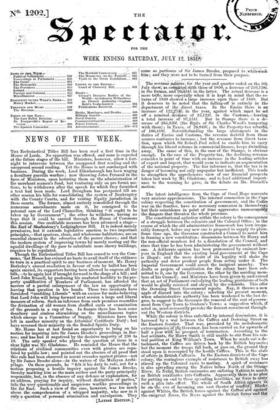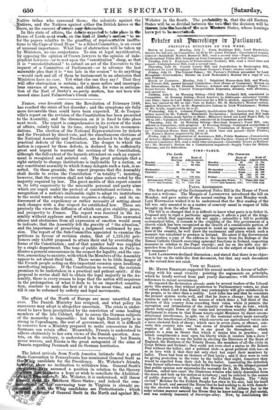: The latest intelligence from the Cape of Good.liope warrants very
anxious apprehensions. The internal commotion in the Cape colony respecting the constitution of government, and the CLAW war on the frontier, have no necessary connexion in themselveag but their coincidence in point of time aggravates immeast1544 the dangers that threaten the whole province. The constitutional agitation within the colony is the consequence of a struggle be6reen the colonists and the Colonial Office ; in the course of which. the old administrative framework has been irrepa7 rably damaged, before any new one is prepared to supply its place. Some time ago, the Governor constructed a Council to assist him in framing a new constitution ; dissension@ between Sir Harry and the non-official members led to a dissolution of the Council, and since that time he has been administering the government without one. A deliberate opinion has been pronounced by eminent law- yers in England that the existing localgovernmcrit at the Cape is illegal; and the mere doubt of • its legality, will shake its authority and deter prudent people from acting under it. The Imperial Government could arrest the inoipient -Anarchy. Two drafts or projets of, constitution for the colony, have been sub- mitted to it, one by the Governor, the other hy, the acceding mem- bers of his Council; and Ministers have been givep7temiderstand that an act of Parliament.embro4ingille loading-provisions of both would be gladly received and obeyed the colonists. This offer the Downing Street Government rejects. Nay, it throws a new apple of discord into__ the colony ; selecting the .present moment, when administratiie _authority has been 'weakened to the last de- gree, to suggest to the Governor the removal of-the seat of govern- ment from Cape Town 6 Graham's Town ; a suggestion which, if acted on, must necessarily provoke the fiercest resentment throUgh-. out the Western districts.
While ,the 'colony is thus enfeebled .by internal dissensions, it is harassed: by a war between .the Caffres and DoWning Street on the Eastern frontier. That war, provoked by the melodramatic extmvageheica:a.A.Governor, has been carried on for upwards of half ri. year Ivitli7no prospect of termination. According to the last aebOhnts,. Sir.- Hairy Sinith is still unable to stir from his cen- tral position at King William's' Town. When he sends out a de- tachment, the Caffres are driven back by the British bayonets ; but the moment the troops fall back, or pass on, the ground they stood upon ii reoccupied by the hostile Caffres. This is the state of affairs in British-Caffraint. In the Eastern districts-of the Cape colony; the Contagious example of resistance to British sway has stirred .up the Colottred races to mutiny. A spirit of resistance is also spreadipg among the Native tribes North of the, Ornnge In Natal British emissaries are enlisting Nativea to march. as British auxiliaries into Caffraria. 'Apparently there is no plan', for patting an end to these sreading hostilities, no force to carry such a plan 'into. effect; The whole of South Africa appears to be (4s :the. eve of. becoming one vast theatre of conflict; Blacks: against Whites, the British-forces against the Caffies-and against the emigrant Boers, the Boors 'against the British forces'and the,
Native tribes who surround them ; the colonists against the atives, and the Natives> against either the British forces or the rs, as the current cdremnits
In this state of affairs5 the deliatieexpecteilito take ?face in lee House of Lords next wealk„ on tits Bid of lashy's =lam " to sa- fer the papers relati've to the granting of representative instItu- lions to the Cape of Good Hope " to a Select Committee, is an event of unusual importance. What line of obstruction will be taken rip by Ministers, no one conjectures. To aim at legal mystification, by opposing the opinion of Crown lawyers to the opinion of inde- pendent lawyers—or to rest upon the "constitution" slang, as that it is "unconstitutional" to submit an act of the Executive to the inquest of a Committee of Parliament—or to advance the last miserable plea that it is "too late in the session" to do anything —would each and all of them be tantamount to an admission that Ministers have no case. Yet what else can they say ? That they will offer obstruction is certain ; for a more active and unscrupu- lous canvass of men, women, and children, for votes in anticipa- tion of the Earl of Derby's no-party motion, has not been wit- nessed since Lord Palmerston's Greek crisis.



























